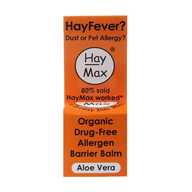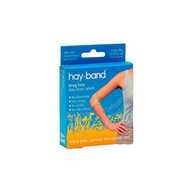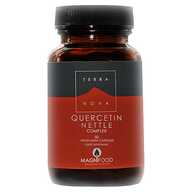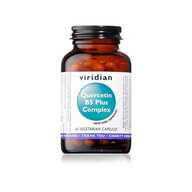What causes hay fever?
We get asked a lot of questions in store on this subject. Here are the most common ones we get asked. And while there are no cures we certainly can help you find the best solution to help ease your symptoms.
What causes hayfever?
Answer: Hay fever is caused by an allergic response to outdoor or indoor allergens, such as pollen, from both flowers and trees, dust mites, even tiny flecks of skin and saliva shed by cats, dogs, and other animals with fur or feathers can cause it.
When is the hayfever season in Ireland?
Answer: Hay fever is usually worse between late March and September, especially when it's warm, humid and windy. This is when the pollen count is at its highest.
One of the remedies we recommend to help prevent or lessen the symptoms of hayfever is A Vogel Pollinosan, a homeopathic remedy which relieves the symptoms of hayfever and allergic rhinitis. It works by desensitising the body from the allergens and so helps lessen the severity and amount of attacks. A great remedy for people who are on medication and it can also be taken alongside antihistamines. A Vogel also does eye drops if you are unfortunate enough to get itchy, watery eyes, really good at soothing your eyes. They have a nasal spray which can help to keep the nasal passages clear of the pollens and dust.
Interestingly Dr Ross Walton, an Immunologist and clinical researcher suggests we may see longer hayfever seasons. He says that increased CO2 levels leads to faster, larger growth of plants and trees and this can lead to a change in the total pollen burden with pollen being produced for longer. Where there is a warmer climate with milder winters it can also lead to prolonged flowering of native flora.
Is pollen the only thing that causes hay fever?
Answer: Pollen from grass, weeds and trees is probably the most common cause of hayfever, but other things that can cause hay fever are dust, animal fur, mould, feathers and even certain foods can trigger a hay fever type response. Another remedy that can help put a physical barrier between your nose and the pollen is Haymax, a gentle gel that you rub on your nostrils to block the pollen getting in.
What are the symptoms of hay fever?
Answer: Hay fever signs and symptoms can include all or any of the following:
Runny nose and nasal congestion.
Watery, itchy, red eyes (allergic conjunctivitis)
Sneezing.
Cough.
Itchy nose, roof of mouth or throat.
Swollen, blue-colored skin under the eyes
Postnasal drip.
Fatigue.
Do I have a cold or hay fever?
Answer: Both hay fever and the common cold causes sneezing, runny or stuffy nose and coughing or any of the above symptoms.
One of the key differences is the colour of the nasal discharge (your snot): it’s more likely to be yellowish/green in colour in colds; while in hay fever, it’s clear.
A sore throat, along with, sneezing and the other hay fever symptoms is most likely to be a cold. Either way, boosting the immune system is one of the key things you can do.
Does Quercetin help with hay fever?
Answer: Many studies have shown that quercetin is effective at stabilising the membranes of mast cells which are responsible for the release of histamine. So in other words Quercetin helps to switch off the immune system reaction to pollens and other allergens. Switching off that allergic reaction or at least dampen it down.
What are the best natural solutions for hay fever?
Answer: One of the top ones would be Quercetin as it helps to dampen down the allergic reaction we have to the pollens etc. Taking it along with Vitamin C will be more potent. Viridian Quercetin Complex is one of our favourites; it contains quercetin, vitamin B5, nettle extract, chamomile flower, pine bark extract, bromelain (from pineapple) and acerola fruit, plus vitamin C. All these ingredients will dampen down the immune response along with anti-inflammatory properties. If you do not like taking tablets or you are pregnant or on medication you could try Hay Band, a band that is worn high up on the arm and works on trigger points to desensitise the allergic reactions. An ideal one to for younger kids, they can keep it on while they run around and during school.
Does hay fever go with age?
Answer: Many people find their hay fever symptoms dwindle as they age, although no one knows why. But on the other hand many people in their 60’s and 70’s suddenly experience symptoms of hay fever and other allergies.
So I guess one of the most important things we can do is support our immune system. Give it the tools to fight off all the free radicals, toxins, viruses, and pollutants etc the environment throws at us.
Check out our top hay fever remedies here: https://www.naturalhealthstore...
If there are topics you would like us to cover just email us info@naturalhealthstore.ie











